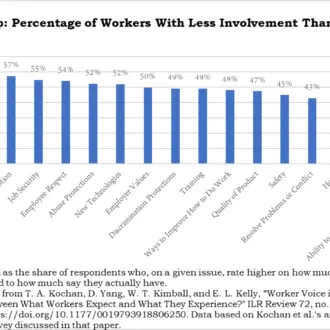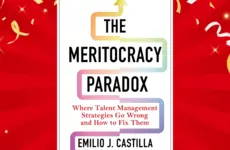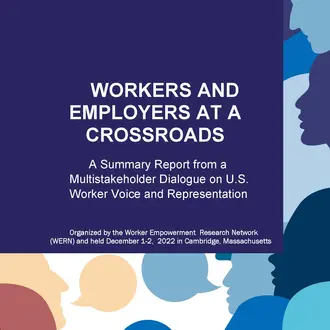Rigorous and Relevant Employment Research
The research conducted by IWER scholars is motivated by important real-world questions and challenges that will help shape work’s future. Our faculty members' research projects address a wide range of timely topics, from identifying sources of income inequality to reducing bias in organizational processes.
Making your organization’s talent management processes fairer and more meritocratic doesn’t have to be complex or expensive. It does, however, require buy-in from top management. The key factors, my research in organizations has shown, are organizational transparency and accountability."Read More
IWER Research Compendiums
New Research by IWER Faculty

-
Institute for Work and Employment Research Can an Employee Participation Initiative Improve Mental Health?
-
IWER Warehouse Work and Well-Being Study
-
Institute for Work and Employment Research The Effects of Worker Voice on Manufacturing Pay and Productivity
-
Institute for Work and Employment Research Announcing Emilio Castilla’s New Book “The Meritocracy Paradox”
-
Press Debate your way to the top: The secret to attaining leadership roles
-
Institute for Work and Employment Research How Job Tasks Can Contribute to Higher Pay for Frontline Workers
Interested in research on creating a better future of work? Sign up for IWER's newsletter.
Sign up to receive MIT IWER's newsletter
Current IWER Faculty Projects

-
Worker Well-Being

Professor Erin L. Kelly studies ways to redesign work to benefit both employees and firms. She has been leading a study that seeks to improve job quality in warehouses as well as workers’ health and well-being. Her work also investigates how work-family challenges can be managed.
-
Reducing Bias in Organizations

Professor Emilio J. Castilla researches people management processes within organizations. His projects include studying the impact of people analytics and other technological advances on key employment outcomes.
-
Inequality and Economic Mobility

Professor Nathan Wilmers studies wage inequality and economic mobility. He investigates topics such as the effects of how work is organized, and the tasks and skills involved in jobs, on workers' economic mobility.
-
Labor Markets

Professor Anna Stansbury studies labor markets, with a particular focus on market power. Her work includes quantifying the micro- and macroeconomic effects of unionization and investigating firms’ incentives to comply with labor and employment law.
-
Skills Training and Contract Employment

Professor Paul Osterman has conducted extensive research on skills development. He is currently studying the implications of contract employment and freelance work for worker well-being and organizational performance.
-
Worker Voice

Professor Thomas A. Kochan focuses on worker voice. He is currently exploring how to bring the voice of the workforce into the development of generative artificial intelligence applications.
-
Conflict Management

Professor Mary P. Rowe’s work explores topics related to negotiation and conflict management, including the organizational ombuds profession, harassment and bullying, micro-inequities and micro-affirmations, and the role of bystanders in organizations.
Inequality and Worker Activism
Recent Publications by IWER Faculty

Castilla, Emilio J. New York, NY: Columbia University Press, 2025.
Massenkoff, Maxim and Nathan Wilmers. Journal of Public Economics Vol. 244, (2025): 105335.
Kochan, Thomas. Des Moines Register, March 2025.
Wilmers, Nathan, Di Tong, and Victoria Y. Zhang. American Journal of Sociology Vol. 130, No. 5 (2025): 1217-1262.
Bailyn, Lotte, Julia B. Bear ... Erin L. Kelly et al. Journal of Management Inquiry. Forthcoming.
Díaz-Linhart, Yaminette, Thomas Kochan, Arrow Minster, Dongwoo Park, and Duanyi Yang. British Journal of Industrial Relations. Forthcoming.
Stansbury, Anna. ILR Review Vol. 78, No. 1 (2025): 190-216.
Rowe, Mary. Journal of the International Ombuds Association (Mary Rowe Special Issue) Vol. 16, No. 2 (2024).
Cilke, Taylor and Mary Rowe. CREST Security Review, October 2024.
Mun, Eunmi, Shawna Vican, and Erin L. Kelly. Social Forces Vol. 2024, No. soae080 (2024).
“If you organize work so that people are doing the same simple, repetitive thing day after day, they are less likely to be learning and developing human capital than if you have a job rotation where people move across multiple tasks within a workplace.”Read More














